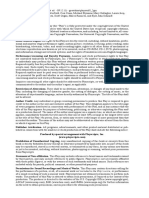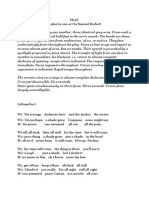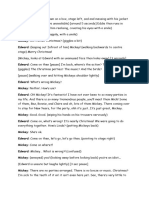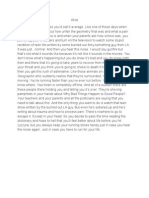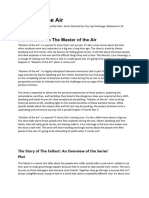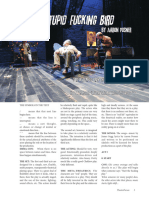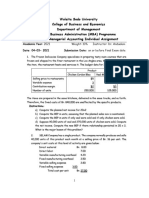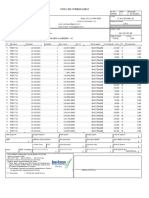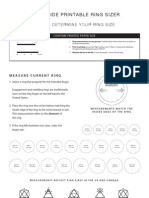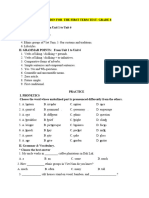Animal Farm Ab6 Digital Script-1
Uploaded by
jon.lambertAnimal Farm Ab6 Digital Script-1
Uploaded by
jon.lambertDigital Script
This PDF is for authorized digital use
only and may not be printed.
Federal law provides severe
civil and criminal penalties for
the unauthorized alteration,
reproduction, distribution or
exhibition of copyrighted materials.
This PDF may not be distributed
in excess of the amount of copies
purchased.
For performance, you must still
apply for rights on our website,
be approved and purchase a cast
quantity of scripts in either digital or
print format.
George Orwell’s
ANIMAL FARM
Adapted by
IAN WOOLDRIDGE
Dramatic Publishing
Woodstock, Illinois • England • Australia • New Zealand
FOR AUTHORIZED DIGITAL USE ONLY
*** NOTICE ***
The amateur and stock acting rights to this work are controlled ex clu-
sively by THE DRAMATIC PUBLISHING COMPANY without whose
permission in writing no performance of it may be given. Royalty must
be paid every time a play is performed whether or not it is presented for
profit and whether or not admission is charged. A play is performed any
time it is acted be fore an au di ence. Cur rent roy alty rates, ap pli ca tions and
restrictions may be found at our Web site: www.dramaticpublishing.com,
or we may be contacted by mail at: DRAMATIC PUBLISHING COM -
PANY, P.O. Box 129, Woodstock IL 60098.
COPY RIGHT LAW GIVES THE AU THOR OR THE AU THOR’S
AGENT THE EXCLUSIVE RIGHT TO MAKE COPIES. This law pro -
vides authors with a fair return for their creative efforts. Authors earn
their living from the royalties they receive from book sales and from the
performance of their work. Conscientious observance of copyright law is
not only ethical, it encourages authors to continue their creative work.
This work is fully protected by copyright. No alterations, deletions or
substitutions may be made in the work without the prior written consent
of the publisher. No part of this work may be reproduced or transmitted
in any form or by any means, electronic or mechanical, including
photocopy, recording, videotape, film, or any information storage and re -
trieval system, without permission in writing from the publisher. It may
not be performed either by professionals or amateurs without payment of
royalty. All rights, including, but not limited to, the professional, motion
picture, radio, television, videotape, foreign language, tabloid, recitation,
lec tur ing, pub li ca tion and read ing, are re served.
For per for mance of any songs, mu sic and re cord ings men tioned in this
play which are in copyright, the permission of the copyright owners
must be obtained or other songs and recordings in the public domain
substituted.
© MMV by
Ian Wooldridge and the Es tate of Sonia Brownell Or well
Based on the book Animal Farm © MCMXLVI by
the Es tate of Sonia Brownell Or well
Printed in the United States of America
All Rights Reserved
(AN I MAL FARM)
For all other rights, contact:
Pe ters Fra ser & Dunlop, Drury House, 34-43 Rus sell Street,
Lon don WC2B 5HA - Fax (44) (0)20 7836 9541
ISBN: 1-58342-271-4
FOR AUTHORIZED DIGITAL USE ONLY
For the invisible cat,
wher ever she is!
FOR AUTHORIZED DIGITAL USE ONLY
IMPORTANT BILLING AND CREDIT REQUIREMENTS
All pro duc ers of the play must give credit to George Orwell as the au thor
of the book and Ian Wooldridge as the dramatizer of the play in all pro -
grams distributed in connection with performances of the play and in all
instances in which the title of the play appears for purposes of ad ver tis-
ing, publicizing or otherwise ex ploit ing the play and/or a pro duc tion. The
names of George Or well and Ian Wooldridge must also ap pear on a sep a -
rate line, on which no other name appears, immediately following the ti -
tle, and must appear in size of type not less than fifty percent the size of
the title type. Biographical in formation on George Or well and Ian
Wooldridge, if included in the playbook, may be used in all pro grams. In
all pro grams this no tice must ap pear:
Produced by special arrangement with
THE DRA MATIC PUB LISHING COM PANY of Woodstock, Il li nois
FOR AUTHORIZED DIGITAL USE ONLY
PRODUCTION NOTES
When I adapted Animal Farm for the stage, I was working as
Artistic Director of a small-scale touring company, based in
Glasgow. In the first production, the Commandments were writ -
ten on a blackboard, and the animals existed in a world that was
part playground, part circus, but most of all, a farmyard of the
imagination. Audiences were made up mainly of young people,
many of whom knew little or nothing about Soviet history, yet
they immediately identified with the story, characters, their re la-
tionships and situation. In discussions after the show, the lead -
ing pigs were readily identified with politicians of the day, and
subsequent productions in the UK and abroad have provoked
audiences to similar reactions of amusement and shock. Noth ing
stays the same, but, as Animal Farm reminds us, one thing re -
mains constant—the pigs will always be there, snouts in the
trough, looking up every now and then, and eyeing the farm -
house greedily.
Staging
This adaptation was written for a company with limited re -
sources and a commitment to touring in theatres and schools.
This meant that the challenge of presenting the “set-piece”
events of the story—in particular the Revolution, the Battle of
the Cowshed, Snowball’s expulsion, the building of the wind -
mill and Boxer’s departure—had to be met with solutions that
were imaginative, simple, yet theatrically effective. Subsequent
productions have involved a rich variety of presentation. For the
Revolution, a puppet was used for Mr. Jones, wrapped in red
silk and tossed into oblivion, or savagely beaten and almost
drowned in a bath of water. The windmill has been a towering
edifice of suitcases, umbrellas and wooden pallets, a shining sil -
ver construction of air-conditioning ducts, and large children’s
building blocks piled high by the actors using only their fists
5
FOR AUTHORIZED DIGITAL USE ONLY
and feet. Generally the set-pieces have been underscored with
music, both live and recorded.
Ultimately it is for each company to decide how they will
stage these spectacles. Directors, designers, actors, musicians,
technicians, composers and choreographers will all have input to
determine what works best in a given set of circumstances. Sim -
plicity is the key, and people plus imagination, rather than elab -
orate resources, will always produce the best results. When the
going gets tough, as it inevitably will, when the trial and error
process of rehearsal doesn’t seem to be getting anywhere, that is
the time to go back to the original story for ideas and in spi ra-
tion.
Costume and Movement
Depending on the style of the production, costumes should be
minimal, in order to allow maximum movement, freedom and
physical expression. What the actors wear does not have to rep -
resent the animals in any way. Masks and “tails” are not nec es-
sary. Each actor has to create and express the essence of their
animal in movement and sound. So, for example, the pigs might
move on their toes whilst the horses are more flat-footed. Arms
and hands become wings and tails. Animal sounds, which can
have much in common with those of humans, are expressed
freely throughout—the horses snort and whinny, the raven
squawks, the donkey brays and the pigs grunt. When Napoleon
and Squealer walk on “two legs” and the Pigs/Men emerge for
the fi nal en coun ter with Pilkington, cos tume may be used to cre-
ate the right image—they can walk on stilts, or in high platform
boots, and wear elaborate or ridiculous “human” clothes, un seen
before. The moment should be truly shocking and it is for the
actors, us ing their phys i cal skills, to find its com i cal men ace.
Ultimately, observation and practice are the best methods for
realizing the animals. Plus, of course, constantly returning to the
original fairy story in search of clues.
FOR AUTHORIZED DIGITAL USE ONLY
Casting
This version of Animal Farm was originally written for a
company of six actors, but it can accommodate many more ac -
cording to the needs of each production.
For a company of six, the division of parts could be as fol -
lows:
Actor 1 Major / Boxer / Young Animal
Actor 2 Squealer
Actor 3 Napoleon
Actor 4 Snowball / Benjamin
Actor 5 Clover
Actor 6 Moses / Mollie / Minimus / Pilkington
All other parts—sheep, dogs, pigeons, geese and hens—can
be played by members of the company or, with larger numbers,
by individual actors. The types of animals spread ing rumours
about Snowball (page 32-33) are entirely the decision of the
company. The Young Animal has frequently been played as a
puppy but other choices will work just as well.
The Storyteller can be divided amongst all the actors. Mr.
Jones does not speak, and in the original production was rep re-
sented by a life-sized puppet. However, he can be performed by
an actor, who might then play Pilkington at the end.
Whilst it is probably a good idea to have Boxer played by a
man, and Clover and Mollie by women, all the other parts can
be played by actors of either sex.
__________
Thanks to Alan Lyddiard of Northern Stage, Newcastle, and
Ivan Heng of Wild Rice Theatre Company, Singapore, for be -
lieving in it and making it happen; to the schools and youth
theatres who staged it with imagination and flair; and to Nick
Hern and Nicki Stoddart for getting it on the page.
I.W.
FOR AUTHORIZED DIGITAL USE ONLY
This adaptation of Animal Farm was first performed by
TAG Theatre Company at the Cit i zens’ Theatre, Glasgow, in
March 1982. The cast was Tam Dean Burn, Steve Owen, Patri-
cia Ross, Robin Sneller, Vari Sylvester and Laurie Ventry.
Directed by Ian Wooldridge
An i mal Farm was re vived by North ern Stage at the
Gulbenkian Stu dio Theatre, Newcastle-upon-Tyne, in February
1993, and subsequently toured throughout the UK and Europe.
The cast was Janine Birkett, Maria Carrigan, Alan Lyddiard,
Tony Neilson, Derek Walmsley, David Whitaker and Tracey
Wilkinson.
Directed by Alan Lyddiard
Designed by Cath Hieatt
Lighting by Peter Barlow
Music by Test Department, Billy Bragg, David Whitaker
Cho re og ra phy by Frank McConnell
Animal Farm was also performed by Wild Rice Theatre
Company in Singapore in April 2002, directed by Ivan Heng.
FOR AUTHORIZED DIGITAL USE ONLY
ANIMAL FARM
A Fairy Story
CHARACTERS
STORYTELLER
The Pigs
MAJOR
NAPOLEON
SQUEALER
SNOWBALL
MINIMUS
The Horses
BOXER
CLOVER
MOLLIE
BENJAMIN, a donkey
MOSES, a ra ven
YOUNG AN I MAL
The Farmers
MR JONES (non-speaking)
PILKINGTON
As sorted PIGS, PI GEONS, DOGS, GEESE, SHEEP, HENS
9
FOR AUTHORIZED DIGITAL USE ONLY
FOR AUTHORIZED DIGITAL USE ONLY
ANIMAL FARM
STORYTELLER. Mr. Jones of the Manor Farm locked the
hen-houses for the night, but was too drunk to re mem ber
to shut the pop-holes. With the ring of light from his
lantern dancing from side to side, he lurched across the
yard, drew himself a last glass of beer from the barrel in
the scullery, and fell asleep in his armchair, alongside
Mrs. Jones.
As soon as the light went out there was a stirring and a
fluttering all through the farm. Word had gone round
during the day that old Major the prize Middle White
boar had had a strange dream on the previous night and
wished to communicate it to the other animals.
MAJOR. Com rades, you have heard already about the
strange dream that I had last night. But I will come to
the dream later. I have something else to say first. I do
not think, comrades, that I shall be with you for many
months longer, and before I die, I feel it my duty to pass
on to you such wisdom as I have acquired. I have had a
long life, I have had much time for thought and I think I
may say that I understand the nature of life on this earth
as well as any animal now living. It is about this that I
wish to speak to you.
Now, comrades, what is the nature of this life of ours?
Let us face it: our lives are miserable, laborious and
11
FOR AUTHORIZED DIGITAL USE ONLY
12 ANIMAL FARM
short. We are born, we are given just so much food as
will keep the breath in our bodies. Those of us who are
capable of it are forced to work to the last atom of our
strength, and the very instant that our usefulness has
come to an end, we are slaughtered with hideous cruelty.
No animal is free. The life of an animal is misery and
slavery: that is the plain truth.
But is this simply part of the order of nature? Is it be-
cause this land of ours is so poor that it cannot afford a
de cent life to those who dwell upon it? No, comrades, a
thousand times no!
Why then do we continue in this miserable condition?
Because nearly the whole of the produce of our labour is
sto len from us by hu man be ings. There, com rades, is the
answer to all our problems. It is summed up in a single
word—Man. Man is the only real enemy we have. Re-
move Man from the scene, and the root cause of hunger
and overwork is abolished forever.
Man is the only creature that consumes without produc-
ing. He does not give milk. He does not lay eggs, he is
too weak to pull the plough, he cannot run fast enough
to catch rabbits. Yet he is the lord of all the animals. He
sets them to work, he gives back to them the bare mini-
mum that will prevent them from starving and the rest
he keeps for himself.
Is it not crystal clear then, comrades, that all the evils of
this life of ours spring from the tyranny of hu man be-
ings? Only get rid of Man and the produce of labour
would be our own. Almost overnight we could become
FOR AUTHORIZED DIGITAL USE ONLY
ANIMAL FARM 13
rich and free. What then must we do? Why, work night
and day, body and soul, for the overthrow of the human
race. That is my message to you, comrades. Revolution!
I do not know when the Revolution will come, it might
be in a week or in a hundred years, but I know that
sooner or later justice will be done. Fix your eyes on
that, comrades, throughout the short remainder of your
lives. And above all, pass on this message of mine to
those who come after you, so that future gen erations
shall carry on the struggle until it is victorious.
And remember, comrades, your resolution must never
falter. No argument must lead you astray. Never listen
when they tell you that Man and the animals have a
common in terest, that the prosperity of the one is the
prosperity of the other. It is all lies. Man serves the in-
terests of no creature except him self. And among us ani-
mals let there be perfect unity, perfect comradeship in
the struggle. All animals are comrades.
I have little more to say. I merely repeat, remember al-
ways your duty of enmity towards Man and all his ways.
Whatever goes upon two legs is an enemy. Whatever
goes upon four legs or has wings is a friend. And re -
member also that in fighting against Man, we must not
come to re semble him. Even when you have conquered
him, do not adopt his vices. No animal m ust ever live in
a house, or sleep in a bed, or wear clothes, or drink alco-
hol, or smoke tobacco, or touch money, or engage in
trade. All the habits of Man are evil. And, above all, no
animal must ever tyrannize over his own kind. Weak or
FOR AUTHORIZED DIGITAL USE ONLY
14 ANIMAL FARM
strong, clever or simple, we are all brothers. No ani mal
must ever kill any other animal. All animals are equal.
And now, comrades, I will tell you about my dream last
night. I cannot de scribe that dream to you. It was a
dream of the earth as it will be when Man has vanished.
But it reminded me of something that I had long forgot-
ten. Many years ago my mother used to sing an old song
of which she knew only the tune and the first three
words. I had known that tune in my infancy, but it had
long since passed out of my mind. Last night, however,
it came back to me in my dream—and what is more, the
words of the song also came back—words, I am certain,
which were sung by animals of long ago and have been
lost to memory for generations. I will sing you that song
now, comrades, and when I have taught you the tune
you can sing it better for yourselves. It is called “Beasts
of England.”
Beasts of England, beasts of Ireland,
Beasts of every land and clime,
Hearken to my joyful tidings
Of the golden fu ture time.
Soon or late the day is coming,
Tyrant Man shall be o’erthrown,
And the fruitful fields of England
Shall be trod by beasts alone.
Bright will shine the fields of England,
Purer shall its waters be,
Sweeter yet shall blow its breezes
On the day that sets us free.
FOR AUTHORIZED DIGITAL USE ONLY
ANIMAL FARM 15
For that day we all must labour,
Though we die before it break;
Cows and horses, geese and turkeys,
All must toil for freedom’s sake.
Beasts of England, beasts of Ireland,
Beasts of every land and clime,
Hearken well and spread my tidings
Of the golden fu ture time.
(The ANIMALS learn the song. The sound of JONES’s
gun interrupts the singing.)
STORYTELLER. Three nights later old Major died peace-
fully in his sleep.
During the next three months there was much secret ac-
tivity. The work of teaching and organising ev erybody
was done by the pigs, who were the cleverest of the ani-
mals. The three most important pigs were Snowball, Na-
poleon and Squealer who began to develop a system of
thought based on what old Major had said. They called
it Animalism. And then there was Moses, the tame ra-
ven, who was Mr. Jones’s special pet.
MOSES. Yeah, hallelujah, gather round, brothers and sis-
ters. We’re all gonna live on Sugarcandy Mountain. Up
there, friends, up there, just on the other side of the dark
clouds, there lies Sugarcandy Mountain, that happy
country where we poor animals shall rest forever from
our labours. After we die, I say after we die, we gonna
live in that land, where it’s Sunday seven days a week,
clover is in season all the year round and lump sugar
and linseed cake grow on the hedges.
FOR AUTHORIZED DIGITAL USE ONLY
16 ANIMAL FARM
STORYTELLER. And of late Mr. Jones had taken to
drinking more than was good for him, so that he sat all
day in his chair in the kitchen reading the newspapers
and neglecting the animals.
(The Revolution takes place. M R JONES is expelled
from Manor Farm.)
SQUEALER. Silence for Comrade Napoleon!
NAPOLEON. Comrades. Comrades. Jones has gone. The
Revolution marks our first step on the road to freedom.
The farm, our farm, hitherto known as Manor Farm is
now to be called Animal Farm!
SQUEALER. Silence for Comrade Snowball!
SNOWBALL. Comrades, dur ing the past three months we
have taught ourselves to read and write, and have suc-
ceeded in reducing the principles of Animalism to Seven
Commandments which from now on will form the law
by which we all shall live.
The Seven Commandments are as follows:
(The Commandments are revealed at the back. SNOW-
BALL reads out the Commandments and the ANI MALS
re cite them.)
1. Whatever goes upon two legs is an enemy.
2. Whatever goes upon four legs, or has wings, is a
friend.
3. No an i mal shall wear clothes.
4. No an i mal shall sleep in a bed.
5. No an i mal shall drink al co hol.
FOR AUTHORIZED DIGITAL USE ONLY
ANIMAL FARM 17
6. No an i mal shall kill any other an i mal.
7. All animals are equal.
SNOWBALL. Now, comrades, to the hayfield. Let us
make it a point of honour to get in the harvest more
quickly than Jones and his men could do.
(A bucket of milk arrives.)
MOLLIE. What is going to happen to all that milk? Jones
used to mix some of it in our food.
NAPOLEON. Never mind the milk, comrades. That will be
attended to. The harvest is more important. Comrade
Boxer will lead the way. I shall follow in a few min utes.
Forward, comrades!
STORYTELLER. So the animals trooped down to the
hayfield to begin the harvest. And when Mollie came
back in the evening:
MOLLIE. Where’s the milk gone?
STORYTELLER. Mollie—the white mare who drew Mr.
Jones’s trap.
MOLLIE. Will there still be sugar now that the Revolution
has happened?
SNOWBALL. No, we have no means of making sugar on
this farm. Besides, you do not need sugar, you will have
all the oats and hay you want.
MOLLIE. And shall I still be allowed to wear ribbons?
SNOWBALL. Comrade, those ribbons that you are de voted
to are the badge of slavery. Can you not understand that
liberty is worth more than ribbons?
MOLLIE. But can’t I keep this pretty blue ribbon I found
in the farmhouse?
FOR AUTHORIZED DIGITAL USE ONLY
18 ANIMAL FARM
SNOWBALL. Ribbons should be considered as clothes
which are the mark of a human be ing.
(BOXER flings his hat away.)
STORYTELLER. Boxer the carthorse—his per sonal motto:
BOXER. I will work harder!
MOLLIE. And what hap pened to the milk? And what’s go-
ing to happen to the apples from the orchard that you
have said are for your use only?
NAPOLEON. Squealer!
SQUEALER. Comrades, you do not imagine, I hope, that
we pigs are doing this in a spirit of selfishness and privi-
lege? Many of us actually dislike milk and apples, I dis-
like them myself. Our sole object in taking these things
is to preserve our health. Milk and apples, this has been
proved by science, comrades, contain substances abso-
lutely necessary to the well-being of a pig. We pigs are
brain-workers. The whole management and organisation
of this farm depends on us. Day and night we are watch-
ing over your welfare. It is for your sake that we drink
the milk and eat the apples.
Do you know what would happen if we pigs failed in
our duty? Jones would come back! Surely, comrades—
surely there is no one among you who would want Jones
to come back.?
BOXER. What happened at the meeting?
MOLLIE. Why weren’t you there?
BOXER. I was working hard at getting the harvest in. I
for got about the meet ing and I did n’t realise you had all
gone.
FOR AUTHORIZED DIGITAL USE ONLY
ANIMAL FARM 19
MOLLIE. Well, that’s a pity. You’ll just have to try and be
on time in future.
CLOVER. Mollie…
STORYTELLER. Clo ver the mare—Boxer’s workmate.
BOXER. So, tell me what happened. Did Comrade Na po-
leon speak?
MOLLIE. No, Squealer did.
BOXER. And what did he say? Oh, please, you must tell me.
CLOVER. Mollie asked about the milk and the apples,
which the pigs are keeping for themselves.
MOLLIE. And the lumps of sugar from the farmhouse.
CLOVER. And Squealer said the pigs need those things to
help them run the farm better.
BOXER. Is that true?
MOLLIE. No, of course it isn’t. It’s absolute rubbish.
BOXER. No, really, is that what Squealer said?
CLOVER. Yes, if they don’t have the milk and apples they
won’t be able to think properly, and then Jones might
come back.
MOLLIE. He always gives me sugar.
BOXER. Oh, we don’t want that.
MOLLIE. And he let me wear pretty ribbons.
CLOVER. No. So we all agreed that it was best if all the
milk and apples were saved for the pigs.
MOLLIE. One blue, one red, one green…
BOXER. And do you think that’s right, Clover?
CLOVER. Well, everyone agreed so it must be.
BOXER. Was Comrade Na poleon there?
CLOVER. Yes.
BOXER. And did he agree?
CLOVER. Yes, he asked Squealer to speak in the first
place.
FOR AUTHORIZED DIGITAL USE ONLY
20 ANIMAL FARM
BOXER. Oh, well, if Comrade Na poleon says it then it
must be right.
MOLLIE. Honestly, Boxer, you are stupid, why do you
have to agree with everything he says?
BOXER. Well, he’s the cleverest animal on the farm, isn’t
he? So he must…
MOLLIE. Who says so? Benjamin’s clever, Moses was
clever, and so was Mrs. Jones, she used to let me have
ribbons all the time.
CLOVER. Oh, Mollie, stop going on about your ribbons.
You looked silly in them anyway.
MOLLIE. I did not. I’m not silly. At least I’m better at
reading and writing than you are, Boxer, and you, Clover.
CLOVER. Boxer works harder than any of us. He doesn’t
have much time to learn to read and write.
MOLLIE. How much of your A.B.C. can you say, Boxer? I
bet you can’t get as far as I can. I can get up to M which
starts my name.
BOXER. I can say a bit.
MOLLIE. Go on then, let’s hear it.
BOXER. A.B.C.
MOLLIE. There you are see…
CLOVER. Give him a chance, let him have a think.
BOXER. A.B.C. …
MOLLIE. A.B.C.D.E.F.G. …
CLOVER. Mollie, Mollie!
SNOWBALL. Comrades, since some of you have had dif-
ficulty in learning to read and write, we have decided to
reduce the Commandments of Animalism to a single
eas ily re mem bered maxim—FOUR LEGS GOOD, TWO
LEGS BAD
FOR AUTHORIZED DIGITAL USE ONLY
ANIMAL FARM 21
(The ANIMALS recite the maxim.)
Can the sheep remember it?
(The SHEEP recite the maxim.)
STORYTELLER. Early in October news arrived that Jones
and all his men were coming up the track that led to the
farm.
Snowball…
SNOWBALL. Who had studied an old book of Jul ius
Caesar’s campaigns.
STORYTELLER. Gave his orders quickly.
(The Battle of the Cowshed takes place.)
SNOWBALL. Comrades, the enemy has been repelled, we
have won a great victory! But let us not forget, com-
rades, on this joyful occasion that all animals must be
ready to die for Animal Farm if need be.
NAPOLEON. It has been decided, comrades, to create a
military dec oration—“Animal Hero, First Class”—which
we confer on Snowball and Boxer, for their valiant ef-
forts in the Battle of the Cowshed.
CLOVER. Mollie, I have something very serious to say to
you. This morning I saw you looking over the hedge at
the end of the long meadow. There was a man standing
on the other side of the hedge and I was a long way
away, but I am almost certain I saw this—he was talk ing
to you and you were allowing him to stroke your nose.
What does that mean, Mollie?
FOR AUTHORIZED DIGITAL USE ONLY
22 ANIMAL FARM
MOLLIE. He didn’t, I wasn’t, it isn’t true!
CLOVER. Mollie, look me in the face, do you give me
your word of honour that the man was not stroking your
nose.
MOLLIE. It isn’t true!
STORYTELLER. Three days later Mollie disappeared. Noth-
ing was heard of her until one day a pigeon reported…
PIGEON. I saw her, between the shafts of a smart trap
painted red and black outside a pub. A fat red-faced man
was stroking her nose and feeding her with sugar, and
she wore a scarlet ribbon round her forelock. She looked
as if she was enjoying herself.
STORYTELLER. None of the animals ever mentioned
Mollie again.
NAPOLEON. That’s all very well, Comrade Snowball, but
I still main tain sowing a bigger acreage of oats will
serve us better through the winter and that the soil on
the hillside is more suitable for root vegetables.
STORYTELLER. An other meeting, another argument be-
tween Na po leon and Snow ball.
SNOWBALL. But Comrade Napoleon you still haven’t
heard the most important part of my plan yet.
NAPOLEON. Oh yes, what’s that?
SNOWBALL. The building of a windmill…
NAPOLEON. A what?
SNOWBALL. A machine op erated by the wind to generate
electricity and make life easier for all of us. The small
hill in the long pasture is the highest point on the farm,
right? Af ter sur vey ing the ground I have de cided that it’s
the best place to build a windmill, which could be made
to operate a dynamo and supply the farm with electrical
power. This could be used to light our stalls and keep
FOR AUTHORIZED DIGITAL USE ONLY
ANIMAL FARM 23
them warm in winter. It could also run a circular saw, a
chaff cutter, a mangel-slicer and an electrical milking
machine. This farm is old-fashioned, we have only prim-
itive machinery. The power of a windmill would make
our work so much easier, and leave us free to pursue
more noble tasks.
NA PO LEON. Well, com rades, how do we feel about
Snowball’s plan?
SNOWBALL. I’m not saying it will be easy—we shall
have to quarry stone and build walls, make the sails and
find dynamos and cables. But I calculate that the whole
thing could be finished in a year, and after that, so much
labour will be saved that we will only need to work
three days a week. Think of that, comrades.
NAPOLEON. And I say that the year would be better spent
increasing food production. That is our greatest need at
the moment. If we waste time building a windmill, we
will all starve to death.
CLOVER. Vote for Snowball and the three-day week!
SQUEALER. Vote for Napoleon and the full manger!
(An argument ensues.)
NAPOLEON. Comrades, comrades—let us not argue. Let
us vote on the matter, and abide by the decision of the
majority. Now, I think that this windmill idea is a piece
of nonsense, and I advise you all to vote against it.
SNOWBALL. Let us rid ourselves of the chains of sordid
labour. Electricity can do that for us. Just picture our
lives when the wonders of science have freed us from
our daily toil. The windmill will operate threshing ma-
chines, ploughs, harrows, rollers, reap ers and binders,
FOR AUTHORIZED DIGITAL USE ONLY
24 ANIMAL FARM
besides sup plying every stall with light, hot and cold
water and a heater. Let us move forward, comrades, to
an age of true freedom. Let us forge the future of Ani-
mal Farm in the white heat of technology!
(At a sign from NAPOLEON, the DOGS expel SNOW-
BALL from the farm.)
NAPOLEON. From now on, comrades, the weekly meet-
ings will come to an end. They are unnecessary and a
waste of time. In future, all questions relating to the
working of the farm will be set tled by a spe cial com mit-
tee of pigs presided over by myself. The meetings will
be held in private, and you will assemble once a week to
be given your orders, but there will be no more debates.
Minimus, you young porker, come with me.
SQUEALER. Comrades, I trust that every animal here ap-
preciates the sacrifice that Comrade Napoleon has made
in taking this extra labour upon himself. Do not imag ine,
comrades, that leadership is a pleasure—on the con trary,
it is a deep and heavy responsibility. N o one believes
more firmly than Comrade Napoleon that all animals are
equal. He would be only too happy to let you make your
decisions for yourselves. But sometimes you might make
the wrong decision, comrades, and then where should
we be?
Suppose you had decided to follow Snowball with his
moonshine of windmills—Snowball, who, as we now
know, was no better than a criminal.
BOXER. He fought bravely at the Battle of the Cowshed.
FOR AUTHORIZED DIGITAL USE ONLY
ANIMAL FARM 25
SQUEALER. Bravery is not enough. Loyalty and obedi-
ence are more important. And as to the Battle of the
Cowshed, I believe the time will come when we shall
find that Snowball’s part in it was much exaggerated.
Discipline, comrades, iron discipline! That is the watch-
word for today. One false step and our enemies would
be upon us. Surely, comrades, you do not want Jones
back? Very well then, let Comrade Na poleon’s dedi ca-
tion be a shining ex ample to us all. Was it not he, after
all, who said: “All the habits of Man are evil, and above
all, no animal must ever tyrannize over his own kind”?
BOXER. If the holding of meetings means that Jones will
come back, then there must be no more meetings. Com-
rade Napoleon says it, so it must be right.
SQUEALER. Oh, he does, comrades, he does. And one
other thing, com rades, Napoleon has decided to go
ahead with the plans to build the windmill. Now this
will need a very special effort from all of you, as we
will have to carry on running the farm while the wind-
mill is being constructed. It might even be necessary to
reduce your ra tions. I can under stand your surprise,
comrades, but you see, Napoleon has never really been
opposed to the building of a windmill. In fact, the idea
was his own creation in the first place, and Snowball
stole it only to make himself look clever in your eyes.
CLOVER. Why then did Na po leon speak so strongly
against it at the meeting?
SQUEALER. Ah, that was Comrade Na poleon’s cunning.
He appeared to oppose the windmill, only to get rid of
Snowball, who was a dangerous character and a bad in-
fluence. Now that Snowball is out of the way, we can
FOR AUTHORIZED DIGITAL USE ONLY
26 ANIMAL FARM
get on with the job. That, comrades, is what is known as
tactics. Tactics, com rades, tactics.
BOXER. Napoleon is always right.
(The build ing of the wind mill be gins.)
NA PO LEON. All animals will work a sixty-hour week, and
in fu ture there will be work on Sunday afternoon as
well. This work will be strictly voluntary, of course, but
any ani mal not reporting for work will have his rations
cut by half.
In addition, comrades, An imal Farm will begin to en-
gage in trade with the neighbouring farm, not, of course,
for any commercial purpose, but simply to obtain essen-
tial materials such as paraffin oil, nails, string and iron
for the horses’ shoes. Therefore, I am making arrange-
ments to sell a stack of hay, part of the current year’s
wheat crop, and, if necessary, a percentage of the egg
yield to a neighbouring farm. You should welcome this
contribution towards the building of the windmill. And
have no fear, there will be no need for any of you to
come into contact with human beings which would be
most undesirable. I shall take that burden upon myself,
and make all the arrangements.
BENJAMIN. ’Ere…
STORYTELLER. Benjamin, the donkey—
BENJAMIN. ’Ere, didn’t we pass a resolution sometime
back about not having nothing to do with human beings
and not engaging in trade?
BOXER. I can’t remember that.
FOR AUTHORIZED DIGITAL USE ONLY
ANIMAL FARM 27
BENJAMIN. And about money, we’re not supposed to
handle money.
BOXER. I don’t know about that, Benjamin, stop being so
miserable. Aren’t you happier now that Mr. Jones has
gone?
BENJAMIN. I don’t see anything to laugh at. Donkeys live
a long time. None of you has ever seen a dead donkey.
God gave me a tail to keep the flies off, but I’d sooner
have no tail and no flies…
CLOVER. I think Benjamin may be right. I seem to re -
member when old Major first spoke to us on that his-
toric night he mentioned some thing about money.
BOXER. Look, Clover, I don’t remember anything about
that. I’ve told you before, don’t listen to Benjamin. He’s
a nice enough fellow and he does his work all right, but
he’s always grumbling and going around the place look-
ing gloomy.
CLOVER. Yes I know, but he’s often right about things.
He’s older than the rest of us, he can remember every-
thing, and he can read much better than you or I can.
BOXER. What’s that got to do with it?
CLOVER. Well, nothing re ally.
BOXER. I work as hard as I possibly can. I get up an hour
earlier in the morning, and often work in the evening.
We’ve got to get the windmill finished. I haven’t got
time to look at books, and learn to read and write. It’s
what you’re best at that counts.
CLOVER. Yes, of course, Boxer, nobody works harder
than you, and we all respect you for it. I didn’t mean to
upset you. I believe in the Revolution, and the work that
Napoleon is doing as much as you do. It’s just that
FOR AUTHORIZED DIGITAL USE ONLY
28 ANIMAL FARM
sometimes things don’t seem to happen the way that
Ma jor said they would.
BOXER. We mustn’t think too hard about it, Clover. We
must trust Na po leon, he knows best.
CLOVER. I’m sure you’re right.
SQUEALER. Penny for them, Comrade Boxer?
BOXER. Clover and I were just discussing Comrade Na po-
leon’s speech on trade.
SQUEALER. And what conclusions did you come to?
BOXER. Oh, that he’s right of course. It’s just that old
Benjamin, you know how he is, seemed to think we’d
passed some resolution about not talking to hu mans or
trading with them. And Clover…
SQUEALER. Yes…
CLOVER. I thought he might be right.
SQUEALER. Are you certain that this is not something
you have dreamed, comrades? You only imagine that we
passed these resolutions be cause of the lies spread about
by that traitor Snowball. Have you any record of them?
Are they written down anywhere? No, of course they
aren’t, so let us all carry on with our work, and leave
Comrade Na poleon to worry about these other things.
BOXER. There you are you see. Comrade Napoleon is al-
ways right. If he thinks it’s best that we should sell
things, then that is what we should do.
CLOVER. Yes, I know, but I’m sure it’s not a good idea to
have anything to do with human beings. Major did warn
us about that, and what he said then should guide us in
what we do now.
BOXER. He isn’t here anymore. If he was, he’d agree with
Napoleon.
CLOVER. That’s something we’ll never know.
FOR AUTHORIZED DIGITAL USE ONLY
ANIMAL FARM 29
BOXER. No, of course not.
CLOVER. But Benjamin does have a good memory.
BOXER. Oh, don’t start on about him again. “Have you
ever seen a dead donkey,” indeed. “I’d sooner have no
tail and no flies.” All the time. I don’t know what he’s
going on about. If you ask me, all that thinking has
made him a bit soft in the head.
CLOVER. But I’m not asking you, I’m just saying I think
he may be right.
BOXER. Maybe, might, I’m not sure—you’re as bad as he
is, talking in riddles. Come on, back to work, that’ll
solve everything.
CLOVER. Oh, Boxer!
BENJAMIN. I’ve seen them!
CLOVER. What?
BENJAMIN. I said I’ve seen them.
BOXER. Who?
BENJAMIN. Napoleon, Squealer and all the other pigs.
They’ve moved into the farmhouse. They’re living there.
BOXER. I don’t believe you.
BENJAMIN. But it’s true I tell you. I looked through the
kitchen window, and there was Squealer sitting in a
chair with his legs up on the table, read ing a news pa per.
BOXER. I simply don’t believe you.
BENJAMIN. I saw it. And all the other pigs were sitting
around the table, munching apples and drinking milk.
CLOVER. Are you sure?
BENJAMIN. Of course I’m sure. I know what I’ve seen.
CLOVER. Well, I think that’s going a bit too far, don’t
you, Boxer?
BOXER. Well, maybe they need to be in the farmhouse, so
that…
FOR AUTHORIZED DIGITAL USE ONLY
30 ANIMAL FARM
BENJAMIN. But that’s not all, one of the pigeons flew
past the upstairs windows of the farmhouse yesterday,
and you’ll never guess what she saw— Go on, tell them
what you saw…
PIGEON. Well, in the big room where Mr. and Mrs. Jones
used to sleep in the big bed—Napoleon was stretched
out on the bed fast asleep and snoring very loudly.
BENJAMIN. There, you see.
BOXER. How could you see all this if you flew past the
window?
PIGEON. I didn’t only fly past, comrade, I perched on the
windowsill and had a good look.
CLOVER. And saw Napoleon asleep in the bed and heard
him snoring?
PIGEON. Yes, comrade, the window was open.
CLOVER. When was this?
PIGEON. About two hours ago, comrade.
BOXER. Napoleon needs to rest. He works very hard for
all of us. He’d probably been working late last night and
got tired.
BENJAMIN. But he was sleeping in a bed.
BOXER. Well, so what?
BENJAMIN. The Fourth Commandment!
(SQUEALER “ad justs” the Fourth Com mand ment.)
BOXER. What?
CLOVER. Yes, of course, Boxer, Benjamin’s right. The
Fourth Commandment says, “No animal shall sleep in a
bed.” So, if Comrade Na poleon’s sleeping in one, it’s
only right that we should tell the others.
BOXER. Oh, I don’t know about that.
FOR AUTHORIZED DIGITAL USE ONLY
ANIMAL FARM 31
BENJAMIN. Stop being so stubborn, Boxer.
BOXER. Well, you leave me out of it, I don’t want to
cause any trouble. I just want to get on with my work.
You talk to them, Clover, if you like. Nobody ever lis-
tens to me. You bring it up at the next meeting.
CLOVER. I’m not very good at talking in front of all the
others. Benjamin, it would be best if you did it.
BENJAMIN. No, they’ll listen to you. If you start it off,
I’ll support you.
BOXER. You be careful, Clover, don’t get mixed up in
something which is going to upset things…
CLOVER. Benjamin, read the Fourth Commandment.
BENJAMIN. It says—“No animal shall sleep in a bed…
with sheets.”
SQUEALER. So, comrades, you have heard that we pigs
are now sleeping in the beds of the farmhouse? And
why not? You did not suppose, surely, that there was
ever a ruling against beds. A bed merely means a place
to sleep in. A pile of straw in a stall is a bed, properly
regarded. The rule was against sheets which are a hu man
invention. We have removed the sheets from the farm-
house beds, and sleep between blankets. And very com-
fortable they are too! But not more comfortable than we
need, I can tell you, comrades, with all the brainwork we
have to do nowadays. You would not have us too tired
to carry out our duties. Surely none of you wishes to see
Jones back? Well?
CLOVER, BENJAMIN & BOXER. No, comrade.
SQUEALER. Very well then. Because he will come back, I
assure you, if we are not left to get on with our work in
peace and quiet. Oh, one other thing, from now on we’ll
FOR AUTHORIZED DIGITAL USE ONLY
32 ANIMAL FARM
be getting up one hour later in the mornings than the rest
of you, OK?
BOXER. There you see, I told you not to meddle.
STORYTELLER. No vember came with strong winds and
torrential rains. Finally there came a night when the gale
was so violent that the main buildings rocked on their
foundations and several tiles were blown off the roof of
the barn. In the morning, when the animals woke up, a
terrible sight met their eyes.
(The ANIMALS gather at the ruined windmill.)
SQUEALER. Comrades, do you know who is responsible
for this? Do you know the enemy who has come in the
night and overthrown our windmill? Snowball. Snowball
has done this thing, to set back our plans and avenge
himself for his ignominious expulsion. This traitor has
crept here under cover of night and destroyed our work
of nearly a year. Comrades, here and now I pronounce
the death sentence upon Snowball. “An imal Hero, Sec-
ond Class” to any animal who brings him to justice.
NAPOLEON. No more delays, com rades, there is work to
be done. This very morning we begin re-building the
windmill and we will build all through the winter, rain
or shine. We will teach this miserable traitor that he can-
not undo our work so easily. Remember, comrades, there
must be no alteration in our plans; they shall be carried
out to the day. Forward, com rades— Long live the
windmill. Long live An i mal Farm!
ANIMAL 1. He visits the farm at night. I’ve seen him.
ANIMAL 2. Who?
FOR AUTHORIZED DIGITAL USE ONLY
ANIMAL FARM 33
ANIMAL 3. Snowball, of course. He must have stolen all
that corn which went missing two days ago.
ANIMAL 1. Yes, and broken all those eggs, which were
ready for market.
ANIMAL 3. He’s taken the key to the store-shed and
thrown it down the well.
ANIMAL 1. He’s stolen the apples from the orchard.
ANIMAL 2. Broken windows.
ANIMAL 3. De stroyed fences.
ANIMAL 1. Poisoned the milk.
ANIMAL 2. Blocked the drains.
ANIMAL 3. Uprooted the crops.
ANIMAL 1. Throttled the chickens.
SQUEALER. And generally proved himself to be the swine
that he always was. Comrades! A most terrible thing has
been discovered. Snowball was in league with Jones
from the very start. He was Jones’s secret agent all the
time. It has all been proved by documents which he left
behind him and which we have only just discovered. To
my mind this explains a great deal, comrades. Did we
not see for our selves how he at tempted, for tu nately with-
out success, to get us defeated and destroyed at the Bat-
tle of the Cowshed?
BOXER. I do not believe that. Snowball fought bravely at
the Battle of the Cowshed—I saw him myself. Did we
not give him “Animal Hero, First Class” immediately af-
terwards?
SQUEALER. That was our mistake, comrade, for we now
know, it is all written down in the secret documents that
we have found, that in reality he was trying to lure us to
our doom.
FOR AUTHORIZED DIGITAL USE ONLY
34 ANIMAL FARM
BOXER. But he was wounded. We all saw him running
with blood.
SQUEALER. That was all part of the arrangement. I could
show you this in his own writing if you were able to
read it, but you can’t, so I won’t. He would have suc-
ceeded if it had not been for our heroic Leader, Com rade
Napoleon. Do you not remember how, just at the mo-
ment when Jones and his men had got inside the yard,
Snowball suddenly turned and fled and many animals
followed him? And do you remember too, that it was
just at that moment when panic was spreading and all
seemed lost, that Comrade Na poleon sprang forward
with a cry of “Death to Humanity,” and sank his teeth in
Jones’s leg—surely you remember that, comrades?
BOXER. I do not believe that Snowball was a traitor at the
beginning. What he has done since is different. But I be-
lieve that at the Battle of the Cowshed, he was a good
comrade.
SQUEALER. Our Leader, Comrade Napoleon, has stated
categorically—categorically, com rade—that Snowball
was Jones’s agent from the very beginning—yes, and
from long before the Revolution was ever thought of.
BOXER. Ah, that is different. If Comrade Napoleon says
it, it must be right.
SQUEALER. That is the true spirit, comrade. I warn every
animal on the farm to keep their eyes very wide open,
for we have reason to think that some of Snowball’s
agents are lurking among us at the moment.
NAPOLEON. And we shall seek out those traitors in our
midst, comrades. They will confess their crimes and be
punished ac cordingly. Have you anything to confess?
FOR AUTHORIZED DIGITAL USE ONLY
ANIMAL FARM 35
FOUR PIGS. We have secretly been in touch with Snow-
ball ever since his expulsion. We collaborated with him
to destroy the windmill, and were planning to help him
hand over Animal Farm to a neighbouring farm.
NAPOLEON. And…
FOUR PIGS. Snowball ad mitted to us that he had been
Jones’s secret agent for four years.
(The FOUR PIGS are executed.)
NAPOLEON. Does any other animal have anything to con-
fess?
THREE GEESE. Snowball persuaded us to steal corn and
hand it over to him.
(Execution.)
TWO SHEEP. Snowball vis ited us at night and encouraged
us to poison the drinking water.
(Execution.)
ONE HEN. Snowball appeared to me in a dream and in-
cited me to disobey your orders.
(Execution. CLOVER begins to sing “Beasts of Eng-
land.” SQUEALER “adjusts” the Sixth Commandment.)
BOXER. I do not understand it. I would not have believed
that such things could happen on our farm. It must be
due to some fault in ourselves. The solution, as I see it,
is to work harder.
FOR AUTHORIZED DIGITAL USE ONLY
36 ANIMAL FARM
SQUEALER. By a special decree of Comrade Napoleon,
“Beasts of England” has been abolished. It is now for-
bidden to sing it.
CLOVER. Why?
SQUEALER. It is no longer needed, comrade. “Beasts of
England” was the song of the Revolution. But the Revo-
lution is now completed. The execution of the traitors
was the final act. The enemy both external and internal
has been defeated. In “Beasts of England” we expressed
our longing for a better society in days to come. But that
society has now been established. Clearly this song has
no longer any purpose. In its place, Minimus the poet
has composed a new song which begins:
MINIMUS.
Animal Farm, Animal Farm,
Never through me shalt thou
Come to harm!
BENJAMIN. Well, I don’t think much of that, the tune’s
not the same somehow.
CLOVER. The Sixth Commandment. “No ani mal shall kill
any other animal.” Benjamin read me the Sixth Com-
mandment.
BENJAMIN. No!
CLOVER. Oh, please, it’s important.
BENJAMIN. No, I read you the fourth one last time and
that didn’t help.
CLOVER. But I’m sure I’m right this time. I can remem-
ber seeing Snow ball write it up there.
BENJAMIN. Who?
CLOVER. Snowball, oh you remember. It comes after “No
animal shall drink alcohol.” I’ve said them to myself of-
ten enough. Oh, please read it for me. After what hap-
FOR AUTHORIZED DIGITAL USE ONLY
ANIMAL FARM 37
pened I’m very confused now. Comrade Napoleon is al-
ways right of course, but I thought we were working to-
gether and…
BENJAMIN. “No animal shall kill any other animal—
without cause.”
CLOVER. Oh.
(The building of the windmill con tinues as MINIMUS re-
cites his poem.)
MINIMUS.
Friend of the fatherless!
Fountain of happiness!
Lord of the swill-bucket! Oh, how my soul is on
Fire when I gaze at thy
Calm and commanding eye,
Like the sun in the sky,
Comrade Na poleon!
Thou art the giver of
All that thy creatures love,
Full belly twice a day, clean straw to roll upon;
Ev ery beast great or small
Sleeps at peace in his stall,
Thou watchest over all,
Comrade Na poleon!
Had I a sucking-pig,
Ere he had grown as big
Even as a pint bot tle or a roll ing-pin,
He should have learned to be
Faithful and true to thee,
FOR AUTHORIZED DIGITAL USE ONLY
38 ANIMAL FARM
Yes, his first squeak should be
“Comrade Napoleon!”
BOXER. Please inform our Leader, Comrade Napoleon,
that the windmill is now completed.
NAPOLEON. It is fitting, comrades, that on this historic
day we should proclaim that Animal Farm is now a Re-
public.
SQUEALER. And announce that our Leader, Comrade Na-
poleon, has been unanimously elected as its first Presi-
dent. A new decoration, The Order of the Green Ban ner,
has been created to mark the occasion and President Na-
poleon is its first recipient.
(A “spontaneous demonstration” takes place.)
NAPOLEON. We have won a great victory, comrades, and
are now truly our own masters. The building of the
windmill, which will be marked by an anniversary each
year, serves to remind us that through our own efforts
we can control our destiny. But this wonderful effort
should not give rise to complacency. The struggle must
go on, we must work even harder. The windmill will not
be used to generate electricity, but to grind corn, which
should yield a handsome profit. We shall build another
windmill, comrades, and when that one is finished, we
shall install the dynamos. But the changes which the
trai tor Snow ball—who as we all know was Jones’s agent
before the Revolution, and fought on Jones’s side at the
Battle of the Cowshed—the changes which he talked
about, namely electric light and heat, will not take place,
because they are contrary to the spirit of Animalism.
The truest hap pi ness lies in working hard and living fru-
FOR AUTHORIZED DIGITAL USE ONLY
ANIMAL FARM 39
gally. Each ani mal will receive a special gift of a slice
of apple in recognition of his efforts. Forward, com-
rades, forward in the name of the Revolution. LONG
LIVE AN I MAL FARM!
STORYTELLER. And then, out of the blue, Moses returned.
MOSES. Yeah, comrades, in my absence I have been
away, and where have I been, comrades? Where have I
been? Well, I’ll tell you where I’ve been—I have been
to Sugarcandy Mountain and I have seen the glory of
that lovely land. I have been high above the clouds and
seen the beauty of that place where we all one day shall
rest our weary limbs in everlasting peace.
CLOVER. Tell us about it, Moses, tell us about it.
BENJAMIN. Don’t listen to our flighty friend. It’s just a
load of bull. There is no such place, when you’re dead,
you’re dead.
CLOVER. But our lives here are hard and we are hungry
most of the time. We sleep, we work, we sleep, we
work. There’s no end to it.
MOSES. You are right to chastise the hoofer. As I was
saying, com rades, Sugarcandy Mountain is more beauti-
ful than we can ever imagine. For I have seen the ever-
lasting fields of clover, where the sun shines on and on,
and no cloud dares show its face. I have seen the lin seed
cake growing on the hedges and I’m telling you I have
seen the lumps of sugar hanging in bunches from the
trees. And we’re all gonna go there, comrades, we’re
gonna be there together. We’re gonna live on Sugar-
candy Moun tain. Put your hands together, comrades,
sing your hearts out, let’s hear it for Sugarcandy Moun-
tain.
FOR AUTHORIZED DIGITAL USE ONLY
40 ANIMAL FARM
(The ANIMALS sing and sway. The singing is inter-
rupted by the sound of drunken revelry from the farm-
house. NAPOLEON and SQUEALER enter and hastily
exit in an alcoholic stupor. SQUEALER re-enters to “ad-
just” the Fifth Commandment.)
MOSES. Come on, comrades, sing your hearts out— We’re
gonna live on Sugarcandy Mountain.
CLOVER. What’s the matter, Benjamin?
BENJAMIN (reading the Com mandment). “No ani mal
shall drink alcohol…to excess.”
(The singing goes quiet.)
SQUEALER. For the time being, comrades, it has been
found necessary to make readjustments of rations. From
tomorrow all animals other than pigs will receive two
pounds less corn a day and no carrots on Sundays. This
is being done in an effort to rationalise present food sup-
plies. Remember, comrades, that a too-rigid equality in
rations would be contrary to the principles of Animal-
ism. And let us remind ourselves that in compar i son
with times before the Revolution, we have made enor-
mous improvements. Working hours have been reduced
by 30%, our drinking wa ter is of better quality, 45%
more young ones survive infancy, the average life of an
animal is longer by 25%, animal literacy is up 630%, in-
cidents of foot and mouth dis ease, foulpest and mange
reduced by 85%, and glanders al most completely eradi-
cated, production of milk is up 35.5%, of eggs 43.25%,
and of wool 53.85%.
FOR AUTHORIZED DIGITAL USE ONLY
ANIMAL FARM 41
(BOXER collapses. SQUEALER observes and hurriedly
exits.)
CLOVER. Boxer, what is it?
(BOXER breathes heavily. SQUEALER returns.)
SQUEALER. Comrade Boxer, I can’t tell you how dis-
tressed I am to see you like this. I have already in formed
Comrade Na poleon of your condition and he has in -
structed me to communicate to you his deepest personal
sympathy, and his best wishes for a speedy recovery. You
have always been one of the most loyal workers on the
farm, and even at this moment, Comrade Na poleon is
making arrangements to send you to be treated at a hos-
pital nearby. The vet there can treat you far better than
we can.
CLOVER. In a hospital? But no animal has ever left the
farm before.
BENJAMIN. Except Snowball.
CLOVER. We’ll look after him.
SQUEALER. Nonsense, comrades, nonsense! I can under-
stand your concern, but the plain truth is that we do not
have the facilities here to provide Boxer with the treat-
ment he must have if he is to make a complete re cov ery.
The van will be arriving shortly to take him away.
CLOVER. If Boxer rests for a couple of days, I know he’ll
be strong again.
SQUEALER. There is no argument! Our Leader, Comrade
Napoleon, has said quite definitely that Boxer is to go to
hospital for the good of his health.
FOR AUTHORIZED DIGITAL USE ONLY
42 ANIMAL FARM
BOXER. Oh well, if Comrade Na poleon says it, it must be
right.
(CLOVER and BENJAMIN help BOXER to his feet.)
Thanks, comrades. Don’t worry about me. I’m glad I was
able to see the windmill fin ished at any rate. To tell you
the truth, I’m looking for ward to retiring. I’d only a
month to go anyway. I’ll have time to study a bit, learn
the rest of the alphabet. You’re getting on a bit too, Ben-
jamin, maybe they’ll let you retire too and keep me com-
pany. You get an apple on Sundays, just like the pigs.
(BOXER says goodbye to CLOVER and BENJAMIN.
The van arrives.)
BENJAMIN. Fools, fools, do you not see what is written
on the side of the van—“Al fred Simmonds, Horse
Slaugh terer.” They are send ing Boxer away to be killed.
CLOVER. Boxer! Boxer! Get out, get out quickly, they are
taking you to your death!
(BOXER is taken away.)
STORYTELLER. Boxer was never seen again, and three
days later…
SQUEALER. Comrades, in spite of receiving ev ery atten-
tion a horse could have, Boxer has died in the hospital. I
was there during his last hours, and I can honestly say it
was one of the most affecting sights I have ever seen. At
the end, almost too weak to speak, he whispered in my
ear that his sole sorrow was to have passed on when
FOR AUTHORIZED DIGITAL USE ONLY
ANIMAL FARM 43
there was still so much work to be done. “Forward,
comrades,” he whispered, “forward in the name of the
Revolution. Long live Comrade Napoleon. Napoleon is
always right.” Those were his last words.
NAPOLEON. Ideas which every animal would do well to
adopt as his own, comrades. Let the spirit of Boxer be a
shining example to us all in the difficult times that lie
ahead. He was a true son of the Revolution, and it is all
the more shameful there fore that his passing should have
been marked by the spreading of rumours that he was
be ing taken away to the slaughterhouse.
Some of you read “Horse Slaughterer” on the side of the
van and jumped to the conclusion that Boxer was being
taken away to be killed. It is almost un believable that
any animal could be so stupid. Surely you know me
better than that. The explanation is really very simple.
The van previously belonged to the slaughterer, who
sold it to the vet. Comrade Boxer died receiving the best
care and attention that money could provide. I per son ally
gave the order that no expense was to be spared. Unfor-
tunately it has not been possible to bring back our la-
mented comrade’s remains for internment on the farm,
but I have ordered a large wreath to be made from lau-
rels and sent down to be placed on Boxer’s grave. Let us
cherish his memory, com rades, in our daily lives, and
pledge ourselves to work harder for the prosperity of
Animal Farm as a tribute to him.
MOSES. And have no fear, comrades, for I know that even
now Comrade Boxer is cropping the grass on Sugar-
candy Mountain and resting his weary limbs on those
sun lit pas tures.
FOR AUTHORIZED DIGITAL USE ONLY
44 ANIMAL FARM
CLOVER. Really, Moses? Is he up there now?
MOSES. Why yes, indeed he is, sister, and we should all
rejoice for him, and you all remember now that we’re
gonna join him there after we die. I say, after we die,
we’re gonna live on Sugar…
NAPOLEON. Squealer!!!
SQUEALER. The latest report on the progress of the farm,
comrades, indicates that things are getting better all the
time. Annual income has increased by 225% over the
last three years, sale of timber has increased money sup-
ply to the extent that 15% of our essential materials are
now purchased from outside the farm.
This means that the average working day has been re -
duced by 12% per week over the past six months and
leisure time has been increased by 33%. Time spent in
educating the young has doubled.
CLOVER. It seems to me that our lives are just the same
as they have always been. I try hard to remember what it
was like in the days before the Revolution, and then
again what it was like after Jones had been expelled.
Were things better than they are now? It’s so long ago.
YOUNG ANIMAL. What do you mean Revolution? Who
was Jones? What does expelled mean? Why are you al-
ways wondering if things are better?
CLOVER. You are too young to know. But it’s right that
you should ask, and I’ll tell you what I can remember.
The Revolution hap pened a long, long time ago, and be-
fore it happened a man called Jones ruled over us and
treated us very badly.
YOUNG AN I MAL. What’s a man?
FOR AUTHORIZED DIGITAL USE ONLY
ANIMAL FARM 45
CLOVER. A man is a creature who walks on two legs in-
stead of four. Jones lived in a farmhouse…
YOUNG AN I MAL. Where the pigs live now?
CLOVER. Yes, and he fed us and looked after…
MOSES. My, my, you tell it to the youngster, Sister Clo-
ver, they were fine days to be sure.
SQUEALER. Moses, old chap, do you fancy coming into
the farmhouse for a glass of stout? There’s something I
want to talk to you about.
MOSES. Why, thank you kindly, Comrade Squealer.
CLOVER. And then there came that historic day when
Jones was expelled from the farm and we began to rule
our own lives.
YOUNG AN I MAL. Was it ex cit ing?
CLOVER. Oh yes, very exciting. I can remember the thrill
when we realised we were in charge. When we achieved
perfect unity.
YOUNG AN I MAL. And did things get better?
CLOVER. Why yes, of course they did, we were free. We
had more…we…
BENJAMIN. I can remember everything about my life, and
I know that things are never much better or much worse.
Let’s face it, hunger, hardship and disappointment are
our lot.
CLOVER. But we mustn’t give up hope. It is, after all, an
honour and a privilege to be members of Animal Farm,
still the only farm in the whole country to be owned and
operated by an i mals. The golden future which old Major
promised us and which we used to sing about is still
coming. It may not happen in our lifetime, but it will
happen. We feed ourselves, we work for ourselves, we
serve no man. All animals are equal!
FOR AUTHORIZED DIGITAL USE ONLY
46 ANIMAL FARM
MOSES. Four legs good, two legs better! Four legs good,
two legs better!…
(SQUEALER and NAPOLEON walk on “two legs.” The
sin gle Com mand ment is re vealed.)
CLOVER. What are you doing?
SQUEALER. We, comrades, work hard all day long writ-
ing files, reports, minutes and memoranda.
CLOVER. But then you burn them.
SQUEALER. They are of the highest im portance for the
welfare of the farm.
CLOVER. But what are they for? I mean what…what…?
Benjamin, read the Com mandments—are the Seven
Commandments the same as they used to be, Benjamin?
Oh, please, Benjamin, read it for me just once more.
BENJAMIN. “All animals are equal. But some animals are
more equal than others.”
CLOVER. But what does that mean, Benjamin? We’re all
equal, how can some animals be more equal than oth ers?
All that talk, all the facts, all the paper and all the writ-
ing make ev ery thing so complicated. Too complicated for
me to understand. I believe in the Revolution and every-
thing that our Leader, Comrade Na po leon, says. Just like
Boxer did, and nobody worked harder than him for the
cause. I remember in the early days, just after we’d got
rid of Jones… (She begins to hum “Beasts of England.”)
PILKINGTON. Hello, I said hello, is there anybody there?
Dashed odd—could have sworn the invite said seven
p.m. for cocktails. Not a soul to be seen. Just a bro -
ken-down old carthorse moaning away. Don’t see what
FOR AUTHORIZED DIGITAL USE ONLY
ANIMAL FARM 47
these damned pigs have to be so proud of. Hello—
name’s Pilkington from the farm next door.
NAPOLEON (off). Ah, yes, old boy. Shan’t keep you a
moment.
PILKINGTON. Good, thought I might have a look over the
old place, whilst I’m waiting.
NAPOLEON (off). If you hang on a tick, old man, I’ll give
you a guided tour myself.
PILKINGTON. Ah good, must say it’s looking in abso-
lutely splendid nick. I noticed the windmill on the way
in. Jolly fine achievement. All those animals working
away in the fields, and working jolly hard too. Amaz ing!
Don’t pamper them, that’s the answer, eh? I can see I’ll
be able to pick up a few tips from this visit.
Yes, well I must say I’m glad we’re able to get together
like this to talk about mutual problems. It’s a source of
great satisfaction to me that a long period of mistrust
and misunderstanding has now come to an end. There
was a time, not that I shared such sentiments, when the
respected pro prietors of Animal Farm were regarded not
exactly with hostility but, shall we say, with a certain
measure of misgiving by their neighbours. But now all
such doubts have been dispelled. I hope very much that
this meeting will mark the start of friendly relations be-
tween our selves.
There is no earthly reason why there should be any clash
of interests between pigs and human beings. Your strug-
gles and difficulties are exactly the same as ours. I mean
to say, isn’t the labour problem the same everywhere?
Dare say some of your workers get a bit bolshy at times,
eh? Yes, well I know the problem. Just as you have your
FOR AUTHORIZED DIGITAL USE ONLY
48 ANIMAL FARM
lower an i mals to contend with, we have our lower
classes, what, ha, ha…
(The PIGS/MEN walk on.)
NAPOLEON. Couldn’t agree with you more, old boy. It’s
true we have had our ups and downs in the past, but
hopefully all that is now at an end. The rumours that
have been spread about us have been truly shocking. For
instance, it has been said that we slaughter animals un-
necessarily, and want to stir up revolution on other
farms. Nothing could be further from the truth! Our sole
desire is to live at peace with our neighbours and to
carry on trade to our mutual ad vantage. We own the
farm, and to show our good intentions we have decided
to abolish the custom of addressing each other as com-
rade. Can’t think how it started in the first place any -
way. Our lower animals, as you so rightly put it, Pil-
kington old chap, work longer hours and receive less
food than animals on any other farm. We are justly proud
of our achievement. So, gen tle men, I give you a toast.
PILKINGTON. Exactly—to the prosperity of Ani mal Farm.
NAPOLEON. Wrong, old boy, wrong. It is only fitting that
the farm should be known henceforth by its correct and
original name. So, I give you the toast as before, but in a
different form. Lift your glasses, gentlemen, to the pros-
per ity of Manor Farm!
(The party swells. CLOVER watches in horror.)
THE END
FOR AUTHORIZED DIGITAL USE ONLY
You might also like
- Playscripts Sample Chester Who Painted The W0% (1)Playscripts Sample Chester Who Painted The W92 pages
- Welcome To Thebes. Moira Buffini Prpologue and Act One100% (2)Welcome To Thebes. Moira Buffini Prpologue and Act One32 pages
- Brilliant Adventures (Modern PL - Alistair McDowallNo ratings yetBrilliant Adventures (Modern PL - Alistair McDowall107 pages
- Excerpt From YEN by Anna Jordan PRODUCTION VERSIONNo ratings yetExcerpt From YEN by Anna Jordan PRODUCTION VERSION9 pages
- The Anger of Ernest and Ernestine - Morgan, Ross & CherniakNo ratings yetThe Anger of Ernest and Ernestine - Morgan, Ross & Cherniak28 pages
- Tom Monologue - Burying Your Brother in The PavementNo ratings yetTom Monologue - Burying Your Brother in The Pavement1 page
- Dario Fo - An Accidental Death of An Anarchist100% (2)Dario Fo - An Accidental Death of An Anarchist74 pages
- Q4-The Effects of Gamma Rays On Man-In-The-Moon-Marigolds and Monty Python Superman Script100% (1)Q4-The Effects of Gamma Rays On Man-In-The-Moon-Marigolds and Monty Python Superman Script3 pages
- Fifth Planet Author(s) : David Auburn Source: New England Review (1990-), Vol. 20, No. 2 (Spring, 1999), Pp. 21-59 Published By: Middlebury College Publications Accessed: 24-03-2020 04:20 UTCNo ratings yetFifth Planet Author(s) : David Auburn Source: New England Review (1990-), Vol. 20, No. 2 (Spring, 1999), Pp. 21-59 Published By: Middlebury College Publications Accessed: 24-03-2020 04:20 UTC40 pages
- The Play That Goes Wrong - Henry Lewis Jonathan Sayer Henry Shields - New York, 2017? - Dramatists Play Service - 0822236362 - Anna's ArchiveNo ratings yetThe Play That Goes Wrong - Henry Lewis Jonathan Sayer Henry Shields - New York, 2017? - Dramatists Play Service - 0822236362 - Anna's Archive92 pages
- A Mouthful of Birds by Caryl-Churchill-David-Lan PDFNo ratings yetA Mouthful of Birds by Caryl-Churchill-David-Lan PDF27 pages
- The Brothers Grimm Spectaculathon Cast Final0% (1)The Brothers Grimm Spectaculathon Cast Final2 pages
- The Human Factor - The Critical Importance of Effective Teamwork and Communication in Providing Quality and Safe CareNo ratings yetThe Human Factor - The Critical Importance of Effective Teamwork and Communication in Providing Quality and Safe Care5 pages
- Guide For Taking and Scoring The ECCE Sample Test, Form BNo ratings yetGuide For Taking and Scoring The ECCE Sample Test, Form B3 pages
- PUTHANE 8290: Polyurethane Coating SpecsNo ratings yetPUTHANE 8290: Polyurethane Coating Specs2 pages
- Animal Vocabulary and Sentence PracticeNo ratings yetAnimal Vocabulary and Sentence Practice26 pages
- MBA - Financial & Managerial Assignment-IINo ratings yetMBA - Financial & Managerial Assignment-II2 pages
- Conservation Education and Outreach Techniques 2nd Edition Jacobson PDF Download100% (1)Conservation Education and Outreach Techniques 2nd Edition Jacobson PDF Download48 pages
- Test On Unit 1, First Prep, First Term, 2025, by Dr. Mohamed Shawky ElnaggarNo ratings yetTest On Unit 1, First Prep, First Term, 2025, by Dr. Mohamed Shawky Elnaggar4 pages
- Interpretation of Liver Enzyme Tests - A Rapid Guide100% (2)Interpretation of Liver Enzyme Tests - A Rapid Guide3 pages
- Measuring Shrinkage From Mold Dimensions of Thermoplastics: Standard Test Method ofNo ratings yetMeasuring Shrinkage From Mold Dimensions of Thermoplastics: Standard Test Method of8 pages
- George Bailey in The Twenty-First Century - Are We Moving To The PNo ratings yetGeorge Bailey in The Twenty-First Century - Are We Moving To The P38 pages

